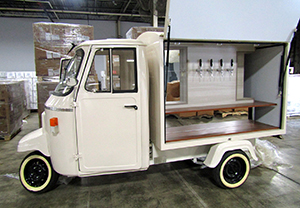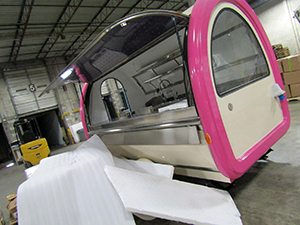NORFOLK, Va. – They were interesting, and they were a bit unusual, but most of all they violated U.S. vehicle safety laws and were turned away recently in Norfolk, Va., by U.S. Customs and Border Protection officers and National Highway Traffic Safety Administration (NHTSA) inspectors.
Fourteen vehicles in all, consisting of food trailers, food buggies, Tuk Tuks, electric golf carts, and a camping trailer, have been seized from October 28, 2023, through Friday for not conforming to Federal Motor Vehicle Safety Standards. Additionally, some of the manufacturers and importers were not registered as vehicle importers with NHTSA, as required by law.
One electric golf cart arrived from Hong Kong, but the remaining 13 vehicles arrived separately from China. The vehicles were destined to addresses in Richmond, Leesburg, and Winchester in Virginia, to Spokane, Wash., and to Cleveland and Shaker Heights in Ohio.
The combined assessed value was about $185,000.
To be lawfully imported, a vehicle must be originally manufactured to comply with all applicable Federal Motor Vehicle Safety Standards (FMVSS) and bear a label certifying such compliance that is permanently affixed in a prescribed location by the vehicle’s original manufacturer in order to be imported free of restrictions into the United States.
“Consumer markets are global today, opening the door to cheaper and unique products, but cheaper doesn’t always mean safe or compliant,” said Mark Laria, CBP’s Area Port Director for the Area Port of Norfolk-Newport News, Va. “If you are considering purchasing unique vehicles like these, carefully research the overseas manufacturers first to ensure that the vehicle you like complies with all applicable U.S. laws for vehicle safety standards and importation.”
If you are interested in importing vehicles to the United States, visit NHTSA’s website to learn rules governing the lawful importation of vehicles, and read through some answers to common vehicle importing questions and concerns.
CBP's border security mission is led at our nation’s Ports of Entry by CBP officers and agriculture specialists from the Office of Field Operations. CBP screens international travelers and cargo and searches for illicit narcotics, unreported currency, weapons, counterfeit consumer goods, prohibited agriculture, invasive weeds and pests, and other illicit products that could potentially harm the American public, U.S. businesses, and our nation’s safety and economic vitality.
See what CBP accomplished during "A Typical Day" in 2023. Learn more at www.CBP.gov.
Follow the Director of CBP’s Baltimore Field Office on X (formerly Twitter) at @DFOBaltimore for breaking news, current events, human interest stories and photos, and CBP’s Office of Field Operations on Instagram at @cbpfieldops.



